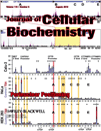
INTERNATIONAL JOURNAL OF BIOCHEMISTRY & CELL BIOLOGY
Scope & Guideline
Catalyzing Breakthroughs in Cellular Research
Introduction
Aims and Scopes
- Molecular Mechanisms in Disease:
Research often centers on molecular pathways and mechanisms that contribute to various diseases, particularly cancer, cardiovascular diseases, and metabolic disorders. - Cellular Signaling and Communication:
Studies explore how cells communicate and regulate their functions through signaling pathways, including the roles of hormones, cytokines, and growth factors. - Epigenetics and Gene Regulation:
Investigations into how epigenetic modifications influence gene expression and contribute to disease progression are prevalent, particularly in cancer biology. - Therapeutic Targets and Drug Development:
The journal highlights research aimed at identifying new therapeutic targets and developing innovative treatment strategies for various diseases. - Advanced Experimental Techniques:
There is a consistent focus on employing cutting-edge experimental methodologies, such as CRISPR, single-cell sequencing, and advanced imaging techniques, to unravel complex biological questions. - Cellular Responses to Environmental Stressors:
Research examines how cells respond to various stressors, including oxidative stress, inflammation, and hypoxia, which are critical in understanding disease mechanisms.
Trending and Emerging
- Cancer Metabolism and Therapeutics:
A growing focus on the metabolic reprogramming of cancer cells and how these changes can be targeted for therapeutic interventions is evident. - Immunology and Inflammation:
Recent publications show an increasing interest in the roles of immune responses and inflammation in disease processes, particularly in cancer and metabolic disorders. - Microbiome and Gut Health:
Research linking the microbiome to metabolic diseases and its implications for health and disease has gained traction, indicating a broader understanding of systemic interactions. - Use of Biomarkers in Disease Diagnosis:
There is a rising trend in studies exploring the use of molecular biomarkers for early diagnosis and prognosis in various diseases, particularly cancers. - RNA Biology and Non-Coding RNAs:
Emerging research on the roles of non-coding RNAs, including microRNAs and long non-coding RNAs, highlights their regulatory functions in gene expression and disease progression. - Cellular Stress Responses and Aging:
Investigations into how cells respond to stress and the implications for aging and age-related diseases are becoming more prominent, reflecting a growing interest in regenerative medicine.
Declining or Waning
- Traditional Enzyme Biochemistry:
Research focused solely on traditional enzyme biochemistry, without context to disease mechanisms or therapeutic applications, has seen a decline in favor of more integrative approaches. - Basic Cell Biology Studies:
General studies of cell biology that do not connect to disease mechanisms or novel therapeutic insights are less frequently published, as the journal shifts towards more applied research. - Classical Genetic Studies:
Research that primarily addresses classical genetics without integrating molecular or biochemical insights into disease pathogenesis is becoming less prominent. - Single-Disease Focus:
There is a noticeable shift away from studies targeting single diseases in isolation; instead, there is a trend toward understanding multi-faceted interactions across different disease states. - Descriptive Studies:
The publication of descriptive studies that lack mechanistic insights or therapeutic implications is decreasing, with a preference for hypothesis-driven research.
Similar Journals

FREE RADICAL BIOLOGY AND MEDICINE
Transforming Understanding of Biochemical Processes and HealthFREE RADICAL BIOLOGY AND MEDICINE, published by Elsevier Science Inc, is a premier journal dedicated to the field of biochemistry and medical physiology. With an ISSN of 0891-5849 and an E-ISSN of 1873-4596, this journal stands out with its impressive ranking in the 2023 category quartiles: Q1 in Biochemistry and Q1 in Physiology (medical). Specifically, it has achieved a remarkable position of 29th out of 438 in Biochemistry and 8th out of 113 in Physiology, placing it firmly in the 93rd percentile of its field, as per Scopus rankings. Since its inception in 1987, the journal has focused on advancing the understanding of free radicals and their role in biological processes, encompassing a wide range of topics from oxidative stress to therapeutic applications. Although it does not currently offer open access, the journal's rigorous peer-review process and impactful research ensure that it remains a valuable resource for researchers and professionals seeking to explore the intricate relationships between free radicals and health. The journal's headquarters are located at STE 800, 230 Park Ave, New York, NY 10169, reflecting its esteemed place within the scientific community and commitment to high-quality research.

CELLULAR & MOLECULAR BIOLOGY LETTERS
Connecting Ideas, Inspiring Innovations in Molecular BiologyCELLULAR & MOLECULAR BIOLOGY LETTERS, published by BMC, is a premier open-access journal dedicated to disseminating high-quality research in the fields of Biochemistry, Cell Biology, and Molecular Biology. Established in 1996, the journal has emerged as a leader in its domain, boasting an impressive Q1 ranking across three critical categories as of 2023, reflecting its significant impact within the scientific community. With an ISSN of 1425-8153 and an E-ISSN of 1689-1392, it offers accessible research findings to a global audience, having been open access since 2013. Situated in the United Kingdom, at CAMPUS, 4 CRINAN ST, LONDON N1 9XW, the journal continues to serve as a vital resource for researchers, professionals, and students, contributing to advancements in the understanding of cellular and molecular processes. By providing a platform for original research, reviews, and short communications, CELLULAR & MOLECULAR BIOLOGY LETTERS plays a crucial role in fostering dialogue and collaboration within the scientific community.

MOLECULAR BIOLOGY
Your Gateway to Cutting-edge Molecular ResearchMOLECULAR BIOLOGY, published by PLEIADES PUBLISHING INC, serves as a vital repository for the dissemination of innovative research within the fields of biochemistry, genetics, and molecular biology. With an ISSN of 0026-8933 and an E-ISSN of 1608-3245, this journal has been a mainstay in the scientific community since its inception, embracing its deep historical roots from 1971 to the present. Recognized for its qualitative contributions, MOLECULAR BIOLOGY is ranked in the Q3 quartile for Biophysics and Q4 for Structural Biology, placing it among select journals in its domain. Researchers and students alike benefit from its rigorous peer-reviewed articles, which focus on all aspects of molecular mechanisms and interactions. The journal's inclusion in prestigious databases underlines its commitment to academic excellence. The editorial board is dedicated to fostering the sharing of influential findings, making it an essential resource for advancing knowledge and innovation in molecular biology.

Autophagy
Unlocking the Secrets of Cellular RecyclingAutophagy is a premier peer-reviewed journal published by Taylor & Francis, Inc. in the United States, focusing on advances in the fields of Cell Biology and Molecular Biology. With an impressive impact factor reflected in its Q1 ranking in both categories, Autophagy stands as a vital resource for researchers and professionals dedicated to understanding the intricate mechanisms of cellular degradation and recycling. The journal has been a cornerstone of scientific communication since its inception in 2005, continuing to flourish through 2024, fostering collaboration and innovation in the study of autophagic processes. Although it does not currently offer Open Access options, the journal remains highly regarded for its rigorous peer-review process and its commitment to publishing high-quality, impactful research. By bridging fundamental research with clinical applications, Autophagy plays a crucial role in advancing our understanding of various diseases, making it an essential tool for scholars and practitioners in the biomedical field.

FEBS LETTERS
Where Innovation Meets Biological DiscoveryFEBS LETTERS, published by Wiley, is a prestigious journal that has firmly established its place in the fields of biochemistry, biophysics, genetics, molecular biology, cell biology, and structural biology. With an esteemed history dating back to 1968, this journal continues to be a vital resource for researchers and professionals involved in the biological sciences. It boasts impressive quartile rankings, including Q1 statuses in several categories such as Biochemistry and Genetics, reflecting its high impact factor and significant contribution to scientific discourse. FEBS LETTERS provides a platform for innovative findings and critical reviews, fostering the exchange of knowledge and ideas within the scientific community. Although it operates under a subscription model, the journal ensures broad dissemination of groundbreaking research through its rigorous peer-review process. The vibrant discussions encouraged by articles published in FEBS LETTERS aim to inspire current and future generations of scientists to push the boundaries of biological understanding, making it an indispensable resource for anyone dedicated to advancing their knowledge in these dynamic fields.

Cell Systems
Shaping the Future of Histology and PathologyCell Systems is an esteemed journal published by CELL PRESS, dedicated to advancing the field of systems biology and its applications in cell biology, histology, and pathology. Since its inception in 2015, it has quickly ascended to a prominent position within the academic community, currently holding a Q1 ranking across multiple categories including Cell Biology, Histology, and Pathology and Forensic Medicine for 2023. With an impressive Scopus ranking—third in Medicine: Pathology and Forensic Medicine, and similarly high standing in Histology—it serves as a key resource for researchers and professionals aiming to explore and disseminate cutting-edge research findings. The journal provides an open-access platform, making it an accessible source of knowledge for students and scholars alike, fostering collaboration and innovation within the dynamic landscape of cellular research. With a commitment to high-quality and impactful publications, Cell Systems plays a pivotal role in shaping the future of biological sciences.

CELLULAR SIGNALLING
Exploring the Intricacies of Cell BiologyCELLULAR SIGNALLING, published by Elsevier Science Inc, is a premier journal within the realm of Cell Biology, boasting an impressive Q2 category ranking as of 2023. With an ISSN of 0898-6568 and an E-ISSN of 1873-3913, the journal has established itself as a critical platform for advancing the understanding of cellular mechanisms and signal transduction pathways since its inception in 1989. Covering a vast array of topics in Biochemistry, Genetics, and Molecular Biology, it ranks notably at 87 out of 285 in the Scopus list, placing it in the 69th percentile among its peers. The journal serves as an invaluable resource for researchers, professionals, and students seeking high-quality, impactful studies that drive forward the field of cellular biology. While it operates under traditional subscription access, its highlights include rigorous peer-reviewed articles, reviews, and insights that continue to shape current scientific discourse.

JOURNAL OF CELLULAR BIOCHEMISTRY
Transforming Knowledge into Breakthroughs in Cellular BiochemistryJournal of Cellular Biochemistry is a premier academic journal dedicated to advancing the field of biochemistry and cellular biology. Published by Wiley, this influential journal has a significant impact factor that underscores its relevance and authority within the scientific community. With its ISSN 0730-2312 and E-ISSN 1097-4644, the journal has been on the frontier of research since its inception in 1982, and is expected to continue publishing cutting-edge studies through 2024. As evidenced by its ranking in the 2023 Scopus Quartiles, it holds a rank of Q2 in Biochemistry and Q3 in both Cell and Molecular Biology, placing it among the top tiers of scientific journals in these disciplines. The Journal of Cellular Biochemistry serves as a vital resource for researchers, professionals, and students alike, providing a platform for the dissemination of innovative ideas and findings that shape our understanding of cellular processes and biochemical pathways. Though it does not currently offer Open Access options, its robust peer-review process ensures that each publication meets the highest academic standards, thus solidifying its esteemed position in the landscape of biochemical research.

ARCHIVES OF PHYSIOLOGY AND BIOCHEMISTRY
Pioneering Research for a Healthier TomorrowArchives of Physiology and Biochemistry, published by Taylor & Francis Ltd, is a renowned journal that has been pivotal in advancing knowledge and research in the fields of physiology and biochemistry since its inception. With an impact factor reflective of its significant contributions, this journal is categorized in Q2 in Medicine (miscellaneous) and Q3 in Physiology, underscoring its relevance and scholarly impact within the scientific community. The journal publishes original research articles, review papers, and innovative methodologies that explore the intricate relationships between physiological functions and biochemical processes. With its commitment to fostering scientific discourse, the Archives of Physiology and Biochemistry serves as an essential resource for researchers, professionals, and students alike, providing insights and evidence that drive forward the frontiers of medical and physiological science. The journal is accessible in both print and online formats, ensuring that critical research reaches a wide audience.

JOURNAL OF CELLULAR AND MOLECULAR MEDICINE
Transforming Discoveries into Practical Applications in Life SciencesJournal of Cellular and Molecular Medicine, published by Wiley, stands at the forefront of research excellence in the fields of cell biology and molecular medicine. With an impressive impact factor reflected in its 2023 Q2 category ranking for both Cell Biology and Molecular Medicine, this journal provides a vital platform for researchers and professionals alike, fostering innovative findings and groundbreaking discoveries since its inception in 2000. Maintaining an open access policy since 2012, the journal ensures that knowledge is freely disseminated, promoting collaboration and progress across the scientific community. With robust rankings in the Scopus database, including a position within the top 85th percentile in Molecular Medicine, the journal remains committed to advancing understanding of cellular functions and their implications in health and disease. Researchers, professionals, and students will find a treasure of high-quality articles and reviews that not only catalyze academic dialogue but also contribute significantly to practical applications in the life sciences.